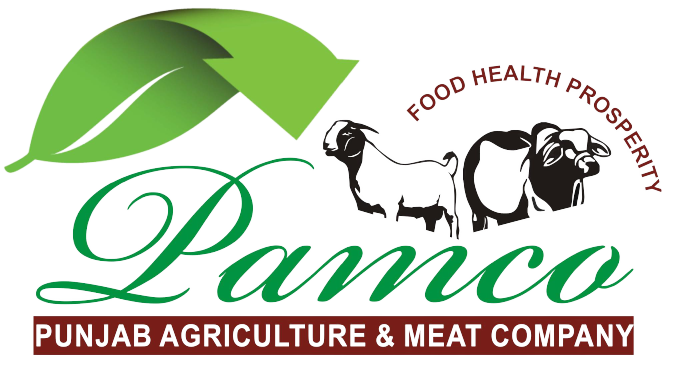Overview of the Organization
“Punjab Agriculture & Meat Company is a Government of the Punjab owned, non-profit R&D organization, duly incorporated and registered under section 42 of Companies Ordinance, 1984. The company has been aimed at formalizing horticulture and meat sector through interventions at each tier of value chain i.e. production, processing and marketing (inland & export) under compliance of international quality standards through public / private channels. PAMCO is running following projects:
1- Lahore Meat Processing Complex (A flagship project of PAMCO)
There is a growing demand of Halal meat and its products at global markets. It is important to abridge the demand and supply gap through R&D initiatives for Halal meat supply system. Currently about 600 billion dollars Global Halal market is facing supply gap due to constraints in terms of quality animals and processing under the compliance regime of international quality standers
State of the art meat processing facilities:
Mechanical slaughtering lines for beef & mutton, Meat processing Facilities, Value
addition through allied products, Supply to Global Halal market, Meat technology
institute in collaboration with UVAS, Blood Rendering Plant, Compost Plant, Waste
Water Treatment Plant, Cooling system (Chilling & Blast Freezing), Compliance of
standards at all tiers of value chain. Its Capacity is 500 beef & 6,000 mutton animals /
8hrs shift and one dedicated municipal shift.
2- Enhancing Beef Production
PAMCO has initiated two projects to enhance beef production “Save the Calf” and “Feedlot Fattening”.
a) Save the Calf Scheme
The calves are reared on whole milk feeding through mother sucking. Therefore, most of the farmers from commercial dairy production system sell calves within 2-3 days of birth which died causing early slaughtering of these calves. It is estimated that 5-6 million male calves are slaughtered before attaining the age of one month; PAMCO took initiative to save these calves providing incentive of Rs.3,200/- against each saved calf to the farmers. This project is successfully progressing to achieve the objective “Save the Calf”, now farmers deliberate calves more valuable than milk.
Salient features:
Those saving min 10 / max 100 calves of max 6 weeks may participate
Internationally accredited third party to certify compliance:
Halal feeding, Disease free farm, No chemical & antibiotic residues
Program’s incentive:
Vaccination free of cost, Rs.3200 cash incentive after 6 months of rearing, Forward supply enhancement
b) Feedlot fattening
Many factors responsible for low meat production including insufficient and improper nutrition, lack of veterinary coverage, poor marketing facilities, non-availability of inputs, lack of finances and absence of appropriate knowledge on feedlot fattening among the farming community
PAMCO studied the causes of low productivity in animals and launched “Feedlot fattening” projects giving incentives to the farmers.
Salient features:
Registration of Beef Fattening Farms, Min.10 & Max 200 animals per farm, Provision of training & technical services, Vaccination & treatment services, Rs.1500/ animal as financial support after 4 months. Ensuring Compliance & Certification, Forward supply enhancement.
PAMCO’s initiatives in Horticulture:
Allah Almighty has blessed Pakistan with diversity of climates, which makes possible to grow large variety of fruits and vegetables in the country. After conducting researches and soil analysis, PAMCO has divided Punjab into three appropriate yield production zones, development of Pothohar as Olive valley, Bhakar as citrus valley and Cholistan as grapes valley.
1- Potohar as Olive production zone
Punjab- Pakistan has world largest (3.18 million haters) Potential area for olive production but inappropriately we are spending on oilseed estimated USD 1.7 billion annually. Punjab Government has planned to exploit the potential of olive production in the province. In this regard, PAMCO has taken initiative to develop certified nurseries through private sector starting from Potohar including Attock, Rawalpindi, Chakwal, Jehlum and Khushab districts.
Economic Impact of Nurseries:
| • 10 Nurseries catchment area | 27,000 acres |
| • Impact on 27,000 acres | USD 78.30 million |
| • Potential area in Punjab | 8,000,000 acres |
| • Target area 5% | 400,000 acres |
| • Expected impact of 400,000 acres | USD 1160 million |
Why Olive as new source:
Does not replace area of other crops, 2- Marginal and barren land can be utilized balancing the ecosystem, 3- Existence of wild olive groves in Potohar exhibit its historical adaptation in the area, 4- Productive age is over two centuries, 5- Environment friendly, drought tolerant with good economic returns, 6- Less plant care needed as compared to other fruit plants, 7- More employment/business in post-harvest, value addition and marketing
2- Cholistan as ‘Grapes Valley’
Keeping in view the success story of Indian Rajhistan as “Grapes Valley”, PAMCO has started to develop Cholistan as Grapes production zone due to similar soil and climatic conditions. Northern part of Lesser Cholistan includes an irrigation zone of 280,000 hectares served by a canal network, where only 130,000 hectares are commendable but only a small part is actually irrigated. PAMCO has initiated to develop nurseries with private partnership to use the idle land.
Grapes Production in Cholistan:
Cholistan has 0.6 million sweet water zone (highly valuable) Conducive climatic and soil conditions for grapes production and Highly recommended by local experts/researchers for grapes.
3- Developing Thal as Citrus Valley
Citrus is the largest group of fruits being produced in the country having high potential of export and ability to fulfill local needs. Production of Seed less citrus will open new doors for foreign reserves because it is highly required in western countries. Pakistan is among top 13 citrus producing nations. About 200 thousand hectares is under citrus cultivation in Pakistan producing annually 1.67 million tones citrus. Pakistan may number among top states while taking some essential steps. PAMCO has initiated to establish different kinds of nurseries including, Seedless Citrus, Washington Navel and Valencia Late in Leyyah and Bhakkar districts. PAMCO provides Certified disease free genetic material (sapling, plants, and cutting), Training of farmers, Compliance and certification system.
Company Profile